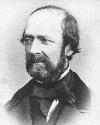 (source)
(source)
|
Jean-Bernard-Léon Foucault
(18 Sep 1819 - 11 Feb 1868)
French physicist whose Foucault Pendulum experimentally proved that the Earth rotates on its axis. Working with Armand Fizeau, and also independently, he made accurate measurements of the absolute velocity of light. In 1850, Foucault showed that light travels slower in water than in air. He also built a gyroscope (1852).
|
Science Quotes by Jean-Bernard-Léon Foucault (2 quotes)
300px.jpg)
Artistic impression of Leon Foucault by A.I.
Science gains from it [the pendulum] more than one can expect. With its huge dimensions, the apparatus presents qualities that one would try in vain to communicate by constructing it on a small [scale], no matter how carefully. Already the regularity of its motion promises the most conclusive results. One collects numbers that, compared with the predictions of theory, permit one to appreciate how far the true pendulum approximates or differs from the abstract system called 'the simple pendulum'.
— Jean-Bernard-Léon Foucault
In 'Demonstration Experimentale du Movement de Rotation de la Terre' (31 May 1851). In C.M. Gariel (ed.), J. Bertrand (ed.) and Harold Burstyn (trans.), Recueil des Travaux Scientifiques de Lion Foucault (1878), Vol. 2, 527.
The observations, so numerous and so important, of the pendulum as object are especially relevant to the length of its oscillations. Those that I propose to make known to the [Paris] Academy [of Sciences] are principally addressed to the direction of the plane of its oscillation, which, moving gradually from east to west, provides evidence to the senses of the diurnal movement of the terrestrial globe.
— Jean-Bernard-Léon Foucault
'Demonstration Physique du Mouvement de Rotation de la Terre', 3 Feb 1851. In C. M. Gariel and J. Bertrand (eds.), Recueil des Travaux Scientifiques de Lion Foucault (1878), Vol. 2, 378. Trans. Harold Burstyn.
Quotes by others about Jean-Bernard-Léon Foucault (1)
The velocity of light is one of the most important of the fundamental constants of Nature. Its measurement by Foucault and Fizeau gave as the result a speed greater in air than in water, thus deciding in favor of the undulatory and against the corpuscular theory. Again, the comparison of the electrostatic and the electromagnetic units gives as an experimental result a value remarkably close to the velocity of light–a result which justified Maxwell in concluding that light is the propagation of an electromagnetic disturbance. Finally, the principle of relativity gives the velocity of light a still greater importance, since one of its fundamental postulates is the constancy of this velocity under all possible conditions.
Studies in Optics (1927), 120.
See also:
- 18 Sep - short biography, births, deaths and events on date of Foucault's birth.
- Foucault’s Pendulum — Leon Foucault’s paper, 'Physical Demonstration of the Earth’s Motion of Rotation, by Means of the Pendulum' (1851).
- Pendulum: Leon Foucault and the Triumph of Science, by Amir D. Aczel. - book suggestion.
 In science it often happens that scientists say, 'You know that's a really good argument; my position is mistaken,' and then they would actually change their minds and you never hear that old view from them again. They really do it. It doesn't happen as often as it should, because scientists are human and change is sometimes painful. But it happens every day. I cannot recall the last time something like that happened in politics or religion.
(1987) --
In science it often happens that scientists say, 'You know that's a really good argument; my position is mistaken,' and then they would actually change their minds and you never hear that old view from them again. They really do it. It doesn't happen as often as it should, because scientists are human and change is sometimes painful. But it happens every day. I cannot recall the last time something like that happened in politics or religion.
(1987) -- 


